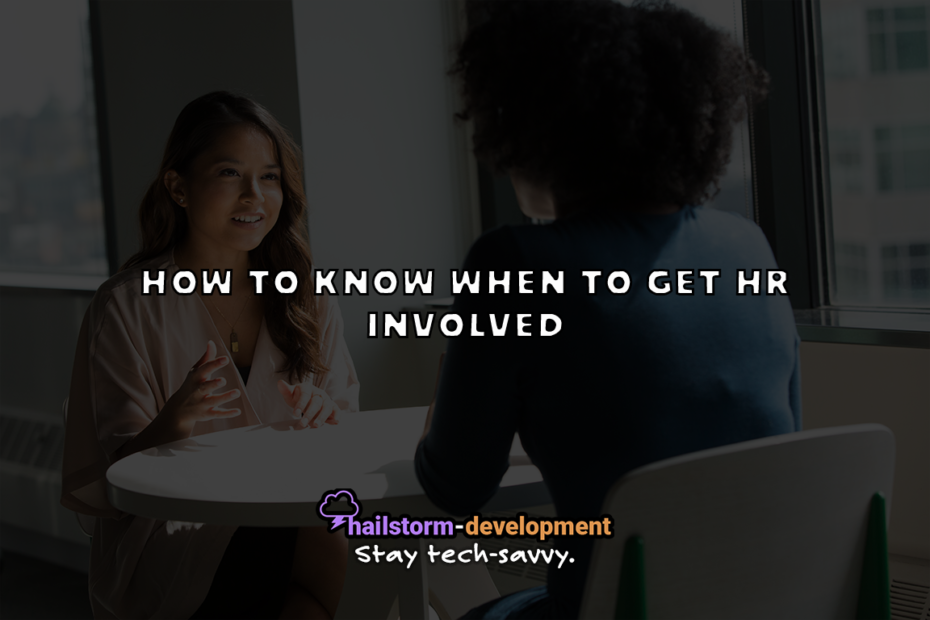How to Know When to Get HR Involved
Sometimes, certain situations at work might be inappropriate or make you feel uncomfortable. However, you don’t have to wait for something to happen before reaching out to HR. In this post, we’ll review a few ways to know when to get HR involved.
Top Times to Contact HR
1. If you have issues with your managers, colleagues, or customers
First, if you’re having an issue with someone – for example, if you’re being harassed or bullied – you probably know it’s in your best interest to get HR involved. On the other hand, if someone else is being treated unfairly or discriminated against, you should bring it up with HR if you don’t feel comfortable speaking with the people involved.

2. If your personal circumstances change
If you’re planning on taking a much-needed vacation, be sure to let HR know as soon as you do. It’s important to inform them early on of any travel plans so that they can plan resources/set expectations with clients accordingly. Also, if you’re expecting a child or plan on taking maternity or paternity leave, they can help there, too.
3. Personal entitlements (think: benefits)
When you first start your job, if you haven’t already, you should ask about the organizations benefits they provide. Can you join any clubs or groups like cycle to work that may result in bonuses?
4. When seeking opportunities
Next, another good reason to reach out to human resources is to talk to them about potential opportunities. It gives them the opportunity to shed light on shadowing or 20% projects, as well as any external training that may be available to you. Either way, it doesn’t hurt to ask! If one of your goals is to progress in your role, they can provide advice.
5. To vent or let off steam
Though we hope your work environment is smooth, calm, and steady, sometimes things don’t go as planned. Sometimes, colleagues or coworkers may say something that upsets you. Your first inkling may be to think HR has better things to deal with, but they’ll likely value your feedback and thoughts about the situation.
The Next Step: Filing a Complaint
Ultimately, if all else fails and you’ve tried speaking with the person, getting your & their manager on the same page as you, or other techniques, it might be time to file a complaint. Some high-level examples of complaint-worthy behavior are:
- When you are asked to do something illegal
- If your boss is abusive
- If your company rights are being violated
- Your benefits are being withheld
- You or someone else is being harassed at work
In Conclusion
All in all, it is generally a good idea to get human resources in the picture sooner rather than later. While not all issues that occur in the workplace may be complaint-worthy, it is good to keep HR in the loop regarding any discrimination, unfair treatment, or the singling of someone out.
Resources & Further Reading
Crawford, H. (2021, October 22). When should you file an HR complaint? | on careers | US news. U.S. News. Retrieved October 27, 2021, from https://money.usnews.com/money/blogs/outside-voices-careers/articles/when-should-you-file-an-hr-complaint.
Guest. (2017, February 6). When should you go to human resources? Undercover Recruiter. Retrieved October 27, 2021, from https://theundercoverrecruiter.com/when-should-you-go-human-resources/.
Recent Posts
The Success Series: How to Leverage Storytelling in Interviews
Learn how to categorize your work and personal experience so...
Read MoreGreat Tech Deals for Amazon Prime Day 2024
Great Tech Deals – Amazon Prime Day 2024 This post...
Read MoreQuick Guide to Google Search
What’s New in Google Search? If you own a business,...
Read MoreMicrosoft Edge’s New RAM Slider
What the RAM Slider Will Do Twitter (now X) user...
Read More



